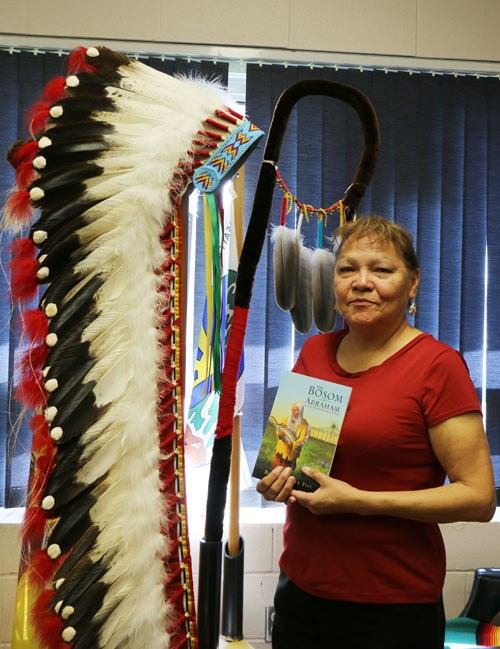It’s a true story of loss and rediscovery. It’s a story still being written for many and although Sarah McArthur is still on her journey through life she has taken the time to write a book under the penname, Beatrice Blue Pipe, about her experiences thus far.
The autobiography titled, “The Bosom of Abraham: Knowledge Must Be Transmitted to the Young,” was a healing process for McArthur - a Nakoda-Cree woman from White Bear First Nation. She is now a Child and Youth Councillor as well as a Nakoda language teacher; but, her path thus far has been a difficult one. Throughout her years she has found peace and now is an advocate for her culture; but, finding that peace was a long road after attending a Residential School as a youth.
Residential Schools were operated by the Canadian government with the specific goal of assimilating First Nations People and wiping out their teachings. The Residential Schools were church-run and government-funded boarding schools that First Nations youth were forced to attend where they were treated abhorrently.
As the summary of the autobiography states on McArthur’s book: “As she grew, the hateful lessons of her youth slowly consumed her, and like too many others, she attempted to silence those demons with alcohol and thoughts of suicide.”
McArthur, however, found her way back to her culture in 1991. She had been a catechism teacher, but her heart was not full; so, she started going to the healing lodge and upon her first visit found she burst into tears. It only took a moment at the lodge to know she was where she needed to be. McArthur, therefore, has found not only peace, but a purpose: to spread knowledge.
“The inspiration for the book came to me in a vision dream in 1999,” McArthur explained. “It wasn’t just a matter of writing the book though, it was a healing process. The content has to do with my life with concentration on the impacts of the residential school.”
“So, writing this book was a healing process in that it helped me process information and it helped me to make sense of my emotions. It allowed me to challenge my belief systems about myself and about indigenous people – First Nations people. Writing the book helped me realize how important our First Nations language and ceremonies are to our sense of self, to our self-esteem, and our concept of healing. It helped me reaffirm my commitment to learning my language and being able to transmit knowledge to the youth.”
McArthur added, “It was a very emotional journey. At times I had to put the book away for four or five months because it took me through emotions of such great sadness and great anger. It helped me to be in balance though and understand that we all have spiritual journeys. Every individual has a purpose on earth.”
Her want in the world is for all peoples to heal together, to be able to move past the hurt done by the residential schools, and for everyone to understand the cultural differences and similarities between each other.
“I believe that the book was healing, but the biggest message out of writing the book is that we are all spiritual beings on a human journey,” McArthur stated. “I believe that our purpose on earth is to connect spiritually, soul to soul, with other humans. No one is greater or lesser than another; we are all equal in terms of being human.”
McArthur’s healing through the book also came through finding her way back to her culture that was ripped from her as a young girl.
“It helped me see First Nations people are stuck in grief; grief from facing trauma in terms of losses, and not just loss as in someone’s death, but loss of land, loss of our ceremonies, loss of our children. We’re stuck in an emotional mire and it’s difficult coming out of that because we are still impacted by the residential schools.”
McArthur adds that the Truth and Reconciliation Commission of Canada Calls to Action were not really beneficial in fostering healing: “Reconciliation needs to take place, but it needs to be amongst aboriginal people, Metis, Inuit, and main stream Canada. We need to all sit down and reconcile through respectful communication and understanding.”
“We need to not only heal as aboriginal people, but we need to heal as the whole of Canada and come to a spiritual understanding that we are all equal. Everybody needs to step up and put aside our preconceived notions of certain cultures and put aside our racial biases, because every one of us is on a spiritual journey.”
“My journey is to get people back to our cultural roots; for them to be strong and proud of who they are,” McArthur said.
The book about McArthur’s life will be available at the Bear Necessities Gift Shop at the Bear Claw Casino for $20.
“I want to thank Derrick Big Eagle for sponsoring the artwork, which was done by Michael Lonechild, and the White Bear First Nation Taxation for their support,” McArthur said.
The process to publish a book can be a long one and McArthur is happy to be able to share her experiences and help educate people about what she and many other First Nations people have endured. She hopes to bring all people closer together for an understanding and respect of each other as humans is her ultimate goal in writing her autobiography.



